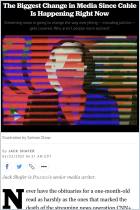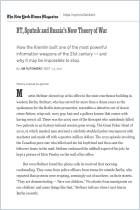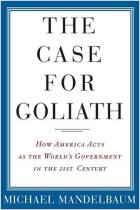加入 getAbstract 阅读摘要

加入 getAbstract 阅读摘要
Mohamed Zayani
The Al Jazeera Phenomenon
Critical Perspectives On New Arab Media
Pluto Press, 2005
看看什么内容?
Al Jazeera is more than a TV network, but is it a PR tool, a fresh way to foster change or a political diversion?
Recommendation
This is a serious collection of 10 academic essays about Al Jazeera, the 24-hour Arabic satellite-broadcasting network. In a sentence, Al Jazeera has transformed the way Arab nations get their news. The essays, edited by Mohammed Zayani, explain how the network and its state sponsor, Qatar, have created political and media turmoil of a scope well beyond the size of the network or the nation. The essays cover the network’s history, Arab journalism, the role of women, the war in Afghanistan, the Israeli-Palestinian conflict, and how the network has affected the media and governments of other Arab nations. The writers explain how other Arab states and the West perceive this new media outlet and its coverage. An outstanding essay by Faisal Al Kasim, the host of a popular Al Jazeera show, The Opposite Direction, gives some powerful reasons why the network is a threat to other Arab nations. Basically, he writes about the power of a free press and how it could transform traditional secular Arab culture. Of course, to U.S. eyes, Al Jazeera often seems polemic, biased and political, but according to these essays, it is by far the freest media outlet in any Arab country. getAbstract.com recommends this book to anyone seriously interested in the Middle East, broadcasting or the impact of technology on shaping public opinion.
Summary
About the Author
Editor Mohamed Zayani, associate professor of critical theory at the American University of Sharjah in the United Arab Emirates, received his Ph.D. from Indiana University. He is the author of Arab Satellite Television, Politics in the Middle East and Reading the Symptom. Other contributors include: Jon Alterman, Faisal Al Kasim, Muhammad I. Ayish, Gloria Awad, Ehab Yassir Bessaiso, Olivier Da Lage, Mohammed El Oifi, Naomi Sakr and Rondha S. Zaharna.























Comment on this summary